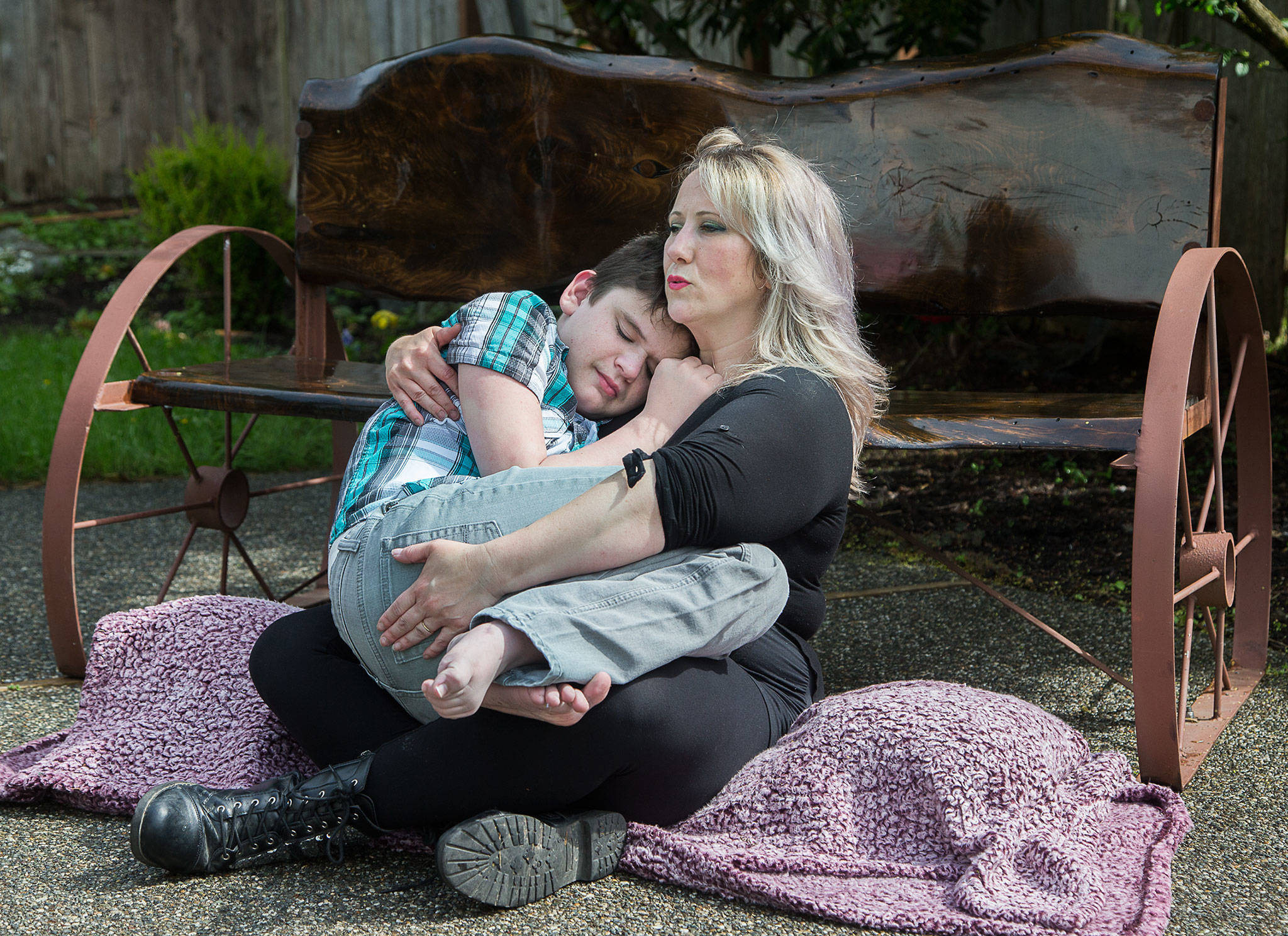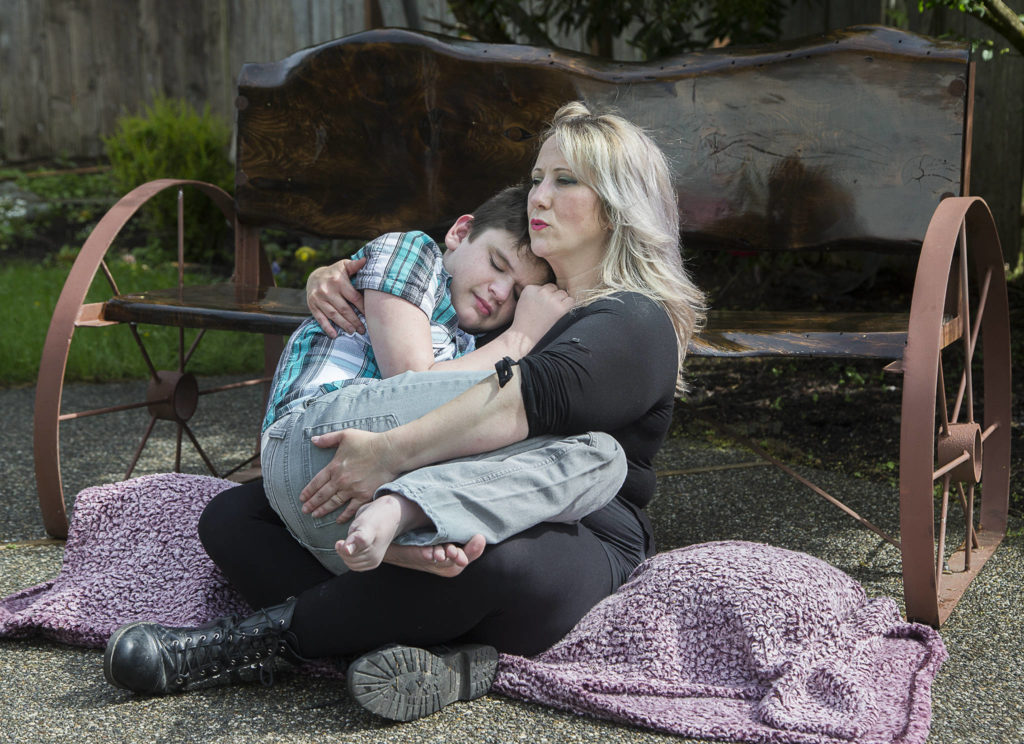By Kaitlyn Johnson / Special to the Herald
ARLINGTON — Jessie Moore hasn’t had as much support to meet her son’s needs since the COVID-19 pandemic closed schools mid-March. That includes lifting and carrying him when necessary and managing his feeding tube. Most of his medical appointments have been canceled, including one to adjust his wheelchair for his scoliosis.
Her teenage son, Stage Atkins, has mitochondrial myopathy, a neurodegenerative condition that worsens when he is less mobile. And unfortunately, their rural Arlington community has no sidewalks. It can be hard for Atkins to get around in his wheelchair, leaving him in bed for much of the day.
This accelerates the deterioration of muscle tissue caused by Atkins’ condition.
“There’s a lot of fear of if he gets sick … and what his options will be for accessing treatment,” Moore said. “Not just for COVID-19 but for his own medical emergencies.”
With the healthcare system strained by COVID-19 patients, she worries medical facilities won’t have the capacity for Atkins’ essential care needs. Throughout the pandemic, Moore and other advocates have worked to ensure those with disabilities aren’t put on the back burner. More recently, COVID cases in Washington state have been on the decline. Yet in other parts of the country that opened up their economies earlier, the number of coronavirus cases has been on the rise, leading some health experts to predict a new wave of COVID illnesses.
Moore is the leadership development coordinator for The Arc of Snohomish County, a branch of one of the nation’s largest organizations advocating for people with intellectual and developmental disabilities.
She isn’t the only one concerned about her son’s health.
In March, disability advocates from The Arc and other organizations filed a complaint to the federal Office for Civil Rights due to rationing guidelines put in place by the state Department of Health, the University of Washington Medical Center and the Northwest Healthcare Response Network, which includes UW Medicine, Swedish and Seattle Children’s Hospital.
The group was concerned that as COVID-19 cases increased, medical staff would have to prioritize who received care. Some federal guidelines recommended treating young, healthy patients first. The group believed it could leave “those who are older and sicker — people with disabilities — to die.”
After the group filed the complaint, they found out the suggestions on care rationing were from about a decade ago, and needed updating. Health care officials have stressed that care rationing is not currently happening. However, people with disabilities are still at an increased risk of complications due to the virus.
Filed on March 23, the complaint points out language used in the guidelines, including one that recommended triage teams consider a patient’s potential “loss of reserves in energy, physical ability, cognition, and general health” when deciding whether to move them to comfort care and out of treatment.
Such language, the complaint alleges, violates federal laws prohibiting discrimination and differential treatment of people due to disability status, including the Americans with Disabilities Act and certain provisions of the Affordable Care Act. Advocates believe that kind of language could be used to justify the denial of proper medical treatment for people with disabilities brought in for treatment of COVID-19.
Moore stressed there are many people like her son who have conditions that suggest grim medical outcomes if infected with the virus. But Atkins has been hospitalized few times compared to others with his condition.
His mother is afraid that if medical care were to be rationed according to these plans, her son could be denied care based on his diagnosis — the exact kind of healthcare discrimination that disability rights activists have been fighting against for decades.
One of those activists is Ivanova Smith, a prominent figure in the disability rights movement living in Pierce County. She signed onto the complaint.
Smith was born in Soviet-occupied Latvia, where she was diagnosed with intellectual and developmental disabilities before being adopted and brought to the United States.
Smith is currently the chair of Self Advocates In Leadership, or SAIL, a statewide legislative advocacy coalition led by and for people with intellectual and developmental disabilities. She has also been active in other disability rights organizations in the past.
Smith became involved with the complaint after seeing articles online about medical professionals having virtual meetings concerning rationing health care.
“A lot of us people with disabilities are born with respiratory issues and breathing issues,” Smith said. “I was born with weak lungs. I don’t know how I would fare (against the virus).”
She brought the issue to SAIL’s rapid response team and eventually several lawyers and organizations.
“I really wanted to speak out as an activist and as chair of SAIL that this is not OK, and this puts our lives at risk,” Smith said about the rationing policies. “We shouldn’t be denied ventilators and we shouldn’t be denied any medical care because of disability status.”
Health officials may already be addressing her concerns, according to recent remarks made by state Department of Health officials in meetings regarding the complaint.
In late March, several disability rights advocates from the Washington State Developmental Disabilities Council and The Arc of Washington State met with representatives from the state Department of Health and governor’s office to talk about the rationing guidelines. They have been revised in the past after input from historically marginalized groups. According to the Department of Health, they will be updated in the coming weeks to clarify they do not intend to make COVID-19 treatment decisions based on disability status.
But for Smith and others with disabilities, the stress of COVID-19 is far from over.
The Centers for Disease Control and Prevention lists people with disabilities as one of several groups at higher risk of contracting the virus. While the spread of COVID-19 has begun to decline in Washington state, the state and federal government continues to emphasize the importance of following social distancing guidelines to maintain the downward trend and protect vulnerable groups.
Smith highlighted the importance of staying home for everyone, but especially those without medical issues. Staying home prevents the virus from spreading to not only healthy individuals but also those who have pre-existing conditions, including many people who have disabilities.
“People that don’t have disabilities are more likely to survive (the virus) and recover,” Smith said. “It’s really important that those folks that have the stronger immune systems do their due diligence to protect people with disabilities from getting the virus.”
Kaitlyn Johnson is a 16-year-old 10th grader at Lake Stevens High School. She has a strong interest in journalism.
Talk to us
> Give us your news tips.
> Send us a letter to the editor.
> More Herald contact information.


























